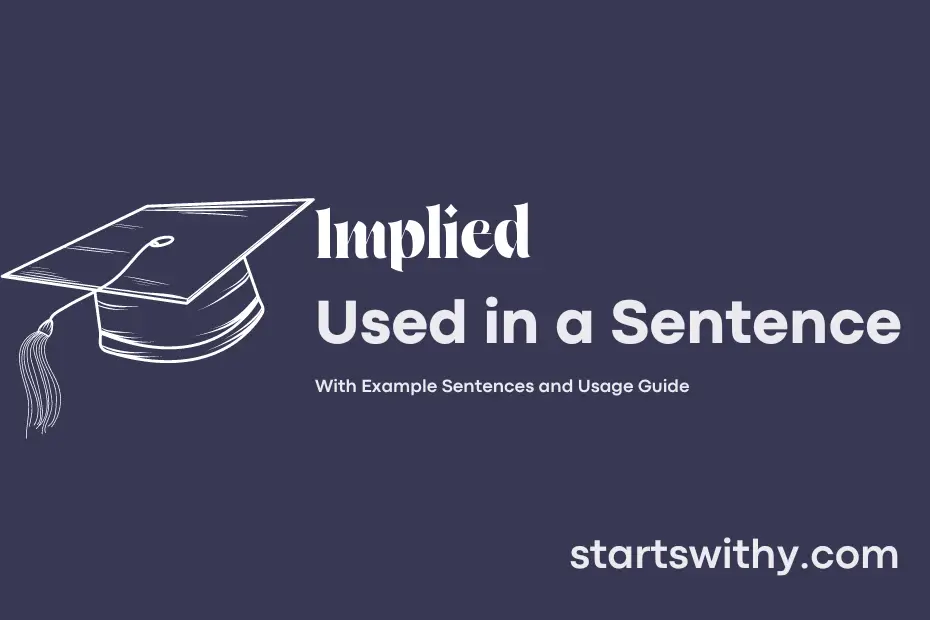Have you ever come across a statement that suggested a meaning without explicitly stating it? That’s where the concept of “implied” comes into play. The term “implied” refers to ideas or messages that are indirectly conveyed or hinted at without being expressly stated.
In everyday communication, implicit meanings are often subtly intertwined with explicit ones, adding layers of depth to conversations and interactions. Understanding implied messages enhances comprehension and helps individuals decipher underlying meanings in various contexts.
7 Examples Of Implied Used In a Sentence For Kids
- Implied means not directly said, but understood.
- When someone winks, it can be an implied secret message.
- In a silent nod, there is an implied agreement.
- Sometimes, feelings like love can be implied through actions.
- A shy smile can be an implied way of showing happiness.
- When we share toys, there is an implied idea of sharing and caring.
- In a game of charades, the answers are implied through gestures.
14 Sentences with Implied Examples
- It was implied in the lecture that attendance is mandatory for all students.
- The professor implied that the final exam will cover topics discussed in the last few classes.
- The syllabus implies that students are expected to study at least two hours a day.
- The assignment guidelines imply that plagiarism will not be tolerated.
- The group project implies that students must collaborate effectively to succeed.
- The student handbook implies that maintaining a minimum GPA is necessary for academic progress.
- The internship opportunity implied that students must have a strong background in their field of study.
- The guest speaker implied the importance of networking for future career opportunities.
- The research paper prompt implies that students must critically analyze the data collected.
- The professor’s feedback implied that more research is needed to strengthen the argument.
- The extracurricular activities implied the importance of developing leadership skills outside the classroom.
- The scholarship application implies that students must demonstrate financial need.
- The course registration form implies that students must meet prerequisites before enrolling.
- The study abroad program implied the benefits of experiencing different cultures.
How To Use Implied in Sentences?
To use “Implied” correctly in a sentence, it’s essential to understand its meaning. “Implied” refers to something that is suggested or understood without being directly stated. Here’s a helpful guide for beginners on how to incorporate this word into a sentence:
-
Identify the context: Before using “Implied,” consider the situation or conversation you are in. Determine whether there is something that is suggested or hinted at without being explicitly mentioned.
-
Choose the right subject:** In your sentence, ensure that you have a subject that can imply something. This can be a person, situation, statement, or action.
-
Include the implication: Craft your sentence in a way that suggests or alludes to something without explicitly stating it. This is where the term “Implied” comes into play.
-
Example sentence: “She didn’t say anything, but her expression implied that she was disappointed with the outcome.”
In this sentence, the use of “Implied” suggests that the woman’s facial expression conveyed her feelings without her having to verbalize them directly.
- Practice and observe: As you become more familiar with using “Implied,” practice incorporating it into your spoken and written communication. Pay attention to how others use this term to convey subtle meanings.
By following these steps and practicing the use of “Implied” in different contexts, you can effectively communicate implied meanings in your sentences.
Conclusion
In conclusion, sentences with implied meanings provide a more nuanced and thought-provoking way to communicate ideas by allowing the listener or reader to infer the unstated information. This can add depth to the conversation or writing, as the audience is engaged in actively interpreting the message. By utilizing implied sentences, writers and speakers can create intrigue, emphasize subtlety, or encourage critical thinking in their audience.
Implied sentences can be a powerful tool in communication, allowing for more creativity and richness in expression. They require the audience to engage with the content on a deeper level, leading to a more interactive and stimulating exchange of ideas. By mastering the art of implied sentences, individuals can effectively convey complex thoughts or emotions in a concise and impactful manner.



